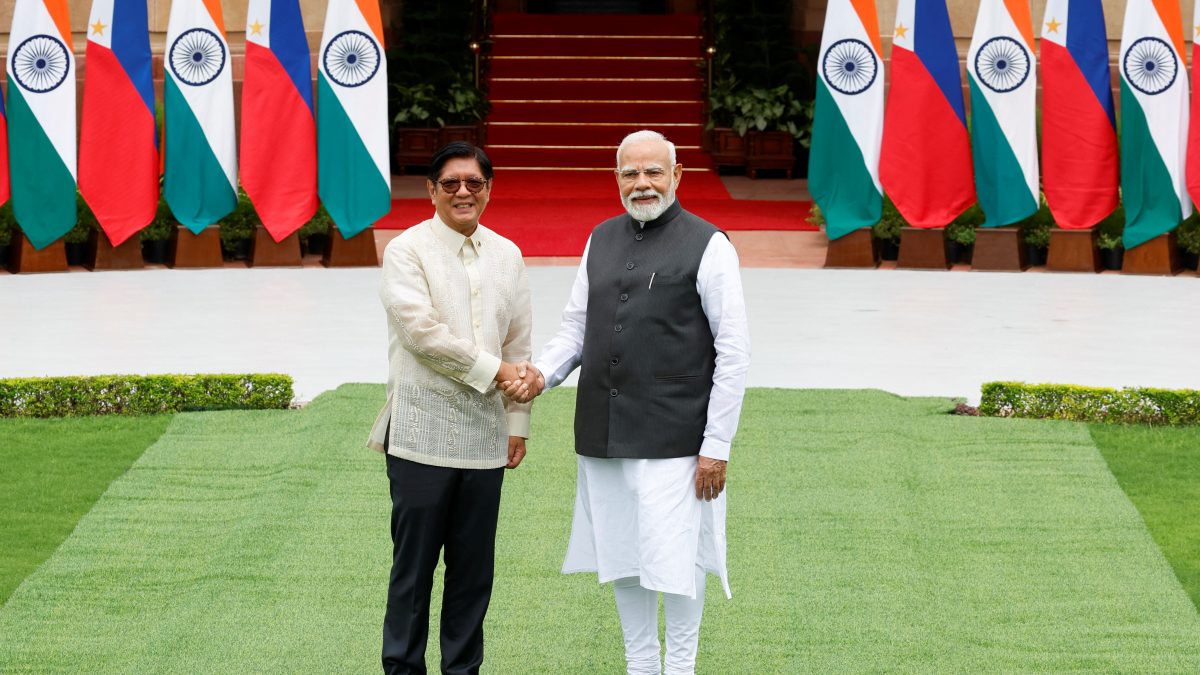India and the Philippines on Tuesday announced the elevation of their bilateral ties to a strategic partnership, with a renewed focus on strengthening trade, defence, and maritime cooperation.
The announcement followed bilateral talks in New Delhi between Indian Prime Minister Narendra Modi and visiting Philippine President Ferdinand Marcos Jr, who arrived in India on Monday for a five-day official visit.
The meeting came a day after the navies of both nations conducted joint exercises for the first time in the disputed South China Sea, a move that has drawn attention and criticism from China.
“India and the Philippines are friends by choice and partners by destiny,” PM Modi said. “From the Indian Ocean to the Pacific, we are united by shared values. Ours is not just a friendship of the past, it is a promise to the future.”
PM Modi added, “It is a matter of pleasure that today we have decided to elevate our relations to the status of a strategic partnership. A comprehensive action plan has also been formulated to translate the potential of this partnership into results.”
The two leaders signed nine agreements, including a declaration on the implementation of the strategic partnership, frameworks for talks among their respective armed forces, and cooperation on the peaceful use of outer space.
India’s Ministry of External Affairs spokesperson, Randhir Jaiswal, said the two countries also agreed to expand cooperation in space, tourism, culture, and digital technologies.
PM Modi highlighted the Philippines as a key partner in India’s Act East Policy and ‘MAHASAGAR’ (Mutual and Holistic Advancement for Security and Growth Across Regions) vision.
Impact Shorts
More Shorts“We are committed to peace, security, prosperity and a rules-based order in the Indo-Pacific region. We support freedom of navigation in accordance with international laws,” he said.
Marcos echoed the sentiment, stating the strategic partnership “will doubtless resonate beyond the confines of our bilateral relationship.” He added, “We want to work with you for a free and open Indo-Pacific.”
PM Modi further thanked the Philippine government for condemning the 22 April terror attack in Pahalgam, which claimed 26 lives, and for standing with India in the fight against terrorism.
PM Modi emphasised that enhanced defence cooperation reflected “deep mutual trust,” and noted the importance of maritime cooperation between the two nations.
“As maritime nations, maritime cooperation between the two countries is both natural and essential. We have been working together in humanitarian aid, disaster relief, search and rescue,” he said.
In a significant development, the Indian government also revealed that discussions are underway with the Philippines for the development of submarine infrastructure, further deepening their defence collaboration.
“Today, when the President is in India, three ships of the Indian Navy are participating in a naval exercise in the Philippines for the first time,” PM Modi said.
On the economic front, trade between the two nations has surpassed USD 3 billion. “To further strengthen trade ties, it is our priority to review the India-ASEAN Free Trade Agreement at the earliest. We have also decided to work towards a bilateral Preferential Trade Agreement,” he stated.
Indian companies are currently active in the Philippines across sectors such as information and digital technology, healthcare, automobiles, infrastructure, and minerals. PM Modi also noted ongoing joint research in science and technology, ranging from virology to artificial intelligence and additive manufacturing. A new science and technology cooperation plan is expected to add momentum to this growing partnership.
Under India’s development partnership initiatives, the number of Quick Impact Projects in the Philippines will be increased, and collaboration in sovereign data cloud infrastructure is also planned.
Marking 75 years of diplomatic ties, PM Modi and Marcos jointly released a commemorative postage stamp.
“This is not just a celebration of our past,” PM Modi said, “but a commitment to a shared future.”


)

)
)
)
)
)
)
)
)



